BYD Sealion 7 Launched At INR 4.89 Million, Bookings Surpass 1,000 Units
- By MT Bureau
- February 17, 2025
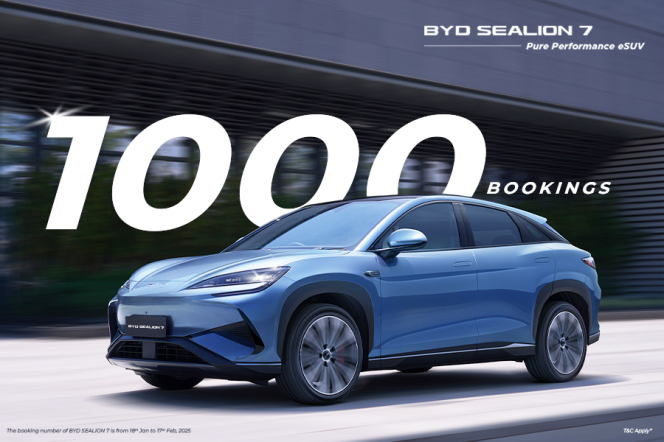
Chinese electric vehicle major BYD has announced the starting price of its new Sealion 7 e-SUV at INR 4.89 million.
The e-SUV comes with 82.56 kWh battery pack and can be had in either Premium and Performance variants. It is equipped with BYD's Intelligence Torque Adaption Control (iTAC) and the CTB (Cell to Body) technology, which integrates BYD’s Blade Battery as a structural element of the chassis.
Rajeev Chauhan, Head of Electric Passenger Vehicles (EPV) Business, BYD India, said, “The unveil of the Sealion 7 at the Bharat Mobility Global Expo 2025 is a milestone event for BYD India. Besides, the Sealion 7 has witnessed an overwhelming response of over 1,000 bookings within a month of announcing the car. Combined with our network expansion to over 40 dealers and counting, this response to the Sealion 7 furthers our vision for innovative and sustainable mobility in India.”
The BYD Sealion 7 can accelerate from zero to 100 kmph in 4.5 secs in the Performance trim and 6.7 seconds in the Premium variant. It has a claimed range of 542 km on the Performance variant, while the Premium comes with a claimed 567 km range.
Designed by BYD's Global Design Director, Wolfgang Egger, the BYD Sealion 7 sports a sleek, flowing lines, an aerodynamic profile and a distinctive ‘Ocean X’ front styling. On the inside, it is equipped with a 15.6-inch rotating touchscreen, Nappa leather seats, and 128-colour ambient lighting options.
- Polestar
- Electric Performance Cars
- Polestar Charge App
- EV Charging Infrastructure
- Tesla Superchargers
Polestar Upgrades Public Charging Offer Across Europe
- By MT Bureau
- February 05, 2026
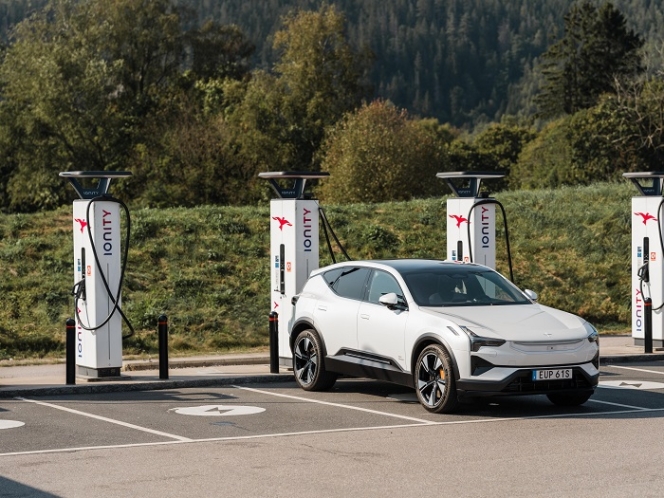
Swedish electric performance car brand Polestar is significantly enhancing the public charging experience for its European drivers through a series of integrated services. Central to this effort is the Polestar Charge app, which now provides streamlined access to an extensive network of more than one million charging points, positioning it as one of the continent's most comprehensive systems. A key feature simplifying this process is Plug & Charge technology, which automates authentication and payment when connecting to compatible stations, offering a seamless experience at nearly a thousand locations in the UK alone.
Further expanding convenience, Polestar has become an early adopter in fully incorporating Tesla Superchargers directly into its own app and vehicle systems. This integration allows drivers to locate, access and utilise over 20,000 Superchargers across Europe without needing separate applications. Real-time availability for these stations is displayed within the car’s native Google Maps navigation, aiding in efficient route and charging stop planning.
The network itself combines major cross-border operators like IONITY, Fastned and Total with regional providers, ensuring wide coverage. For users seeking added value, a subscription option offers reduced rates at more than 80,000 fast-charging points from dozens of operators. The service's popularity is reflected in its rapidly growing user base, which saw a 30 percent rise to over 45,000 users by 2025. Together, these developments create a cohesive and user-focused charging ecosystem for Polestar owners.
Olivier Loedel, Head – Product Software Management, Polestar, said, “With Polestar Charge, we give our customers access to one of the biggest charging networks in Europe. By expanding Plug & Charge and fully integrating Tesla Superchargers, we’re improving our premium seamless charging experience even further. Our strong charging offer, integrated with the in-car navigation in Google Maps, sets us apart from many competitors.”
BYD Named Official Car Partner Of Glasgow 2026 Commonwealth Games
- By MT Bureau
- February 05, 2026
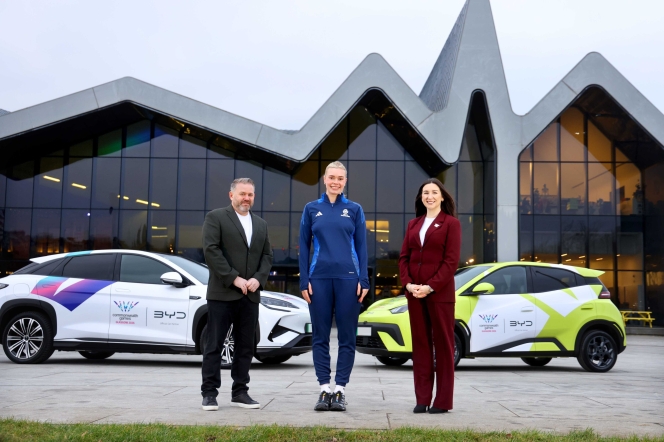
BYD, the world’s leading New Energy Vehicle (NEV) maker, has become the Official Car Partner of the Glasgow 2026 Commonwealth Games. The event, running from 23 July to 2 August 2026, will see 3,000 athletes from 74 nations compete across 10 sports and six Para sports at four venues in the city. For the occasion, BYD will supply a fleet of 90 vehicles to facilitate operations and transport athletes and personnel along the vast competition corridor.
The partnership was announced with the participation of BYD UK's Deputy Country Manager Steve Beattie and Glasgow 2026's Chief Operating Officer Jade Gallagher. They were joined by local swimmer Katie Shanahan, who is set to compete for Team Scotland. BYD will also serve as an Official Partner for the Scottish host nation team, supporting home athletes like Shanahan as they pursue medals.
This collaboration underscores BYD's significant role in the UK's shift towards electric mobility. The company's international prominence is reflected in its domestic sales, having captured a 12.01 percent market share of the fully electric and plug-in hybrid vehicle market through 2025, establishing it as the country's top New Energy Vehicle manufacturer.
Steve Beattie, Deputy Country Manager, BYD UK, said, “BYD is hugely proud to become the Official Car Partner of the Glasgow 2026 Commonwealth Games. With the city’s organisers creating a highly sustainable model for running the Games, I believe BYD’s technology-led approach to reducing emissions makes this agreement the perfect fit for both sides.”
Jade Gallagher, Chief Operating Officer, Glasgow 2026, said, “One of our biggest ambitions for Glasgow 2026 is to be the most environmentally sustainable Commonwealth Games, setting new standards for best practice by using existing venues, reducing waste and carbon emissions. We can’t achieve that without a partner like BYD who have a global reputation for their innovation in new energy vehicles.”
Subaru Begins Production Of BEVs At Upgraded Gunma Yajima Plant
- By MT Bureau
- February 04, 2026
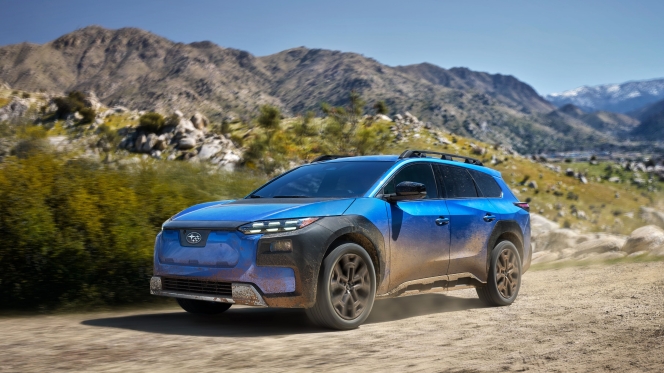
Marking a significant step in its electrification strategy, Subaru Corporation has initiated domestic production of Battery Electric Vehicles at its Gunma Yajima Plant. This launch coincides with the finalisation of extensive upgrades to the plant’s production systems, a project commenced in August 2025. Central to these enhancements is a new, flexible assembly line engineered to manufacture the all-new E-Outback alongside traditional petrol and hybrid models within a single, integrated process. This approach leverages Subaru's established expertise in mixed-model production, allowing the company to adapt efficiently to the evolving automotive landscape.
The E-Outback itself represents a key milestone as Subaru's second global BEV, developed through a longstanding alliance with Toyota Motor Corporation. This partnership, celebrating its twentieth anniversary in 2025, has grown to encompass collaborative efforts in development, production and supply chain management. The recent manufacturing advancements are a direct result of deepened cooperation in electrification technologies, combined with continuous refinement of Subaru’s own manufacturing, or monozukuri, capabilities.
Looking forward, Subaru intends to further increase manufacturing flexibility. This focus aims to achieve greater production efficiency and development agility, thereby strengthening the company's ability to respond to market shifts and bolster its overall competitiveness. The Subaru E-Outback is scheduled for introduction in the United Kingdom during Summer 2026, with full specifications to be disclosed nearer the launch date.
- VinFast
- Investor of the Year
- Urban Electric Vehicle of the Year
- VinFast VF 7
- Motor Vikatan Awards 2026
VinFast Wins Dual Honours In India For Investment And Electric SUV
- By MT Bureau
- January 31, 2026
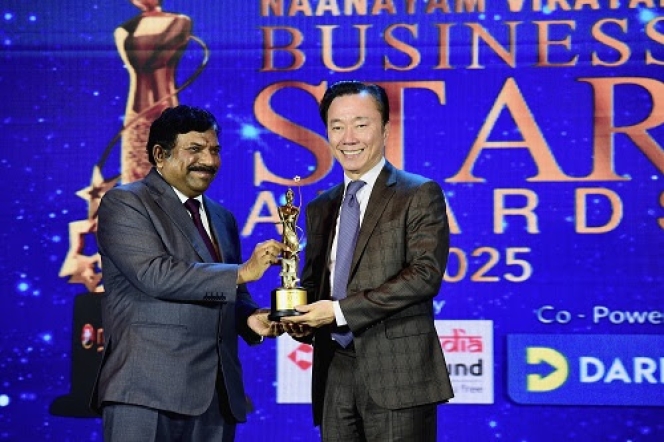
VinFast’s strategic progress in India has been further validated through recent accolades from the influential Vikatan Group media network. The company was distinguished with two significant awards: one recognising its substantial investment commitment, and the other honouring its VF 7 model as the premier urban electric vehicle for 2026. These commendations underscore the brand’s deepening integration into the Indian automotive sector, highlighting both its industrial strategy and its product relevance.
The title of Investor of the Year, conferred by Nanayam Vikatan business magazine, specifically acknowledges VinFast’s landmark commitment to establishing an electric vehicle manufacturing facility in Thoothukudi, Tamil Nadu. This project is noted not only for its scale and strategic clarity but also for its anticipated role in fostering a new industrial corridor, generating employment and bolstering the local supplier network. It aligns with national initiatives like Make in India and reflects confidence in the region’s manufacturing potential.
Concurrently, the VF 7 electric SUV was named Urban Electric Vehicle of the Year at the Motor Vikatan Awards 2026. This recognition from automotive experts underscores the model’s successful adaptation to India’s urban driving conditions, balancing design, performance, safety and comfort. It serves as a testament to VinFast’s product development focus and its localisation strategy aimed at meeting specific market demands.
As a respected media institution in South India with a legacy dating to 1926, the Vikatan Group’s awards carry considerable weight among businesses and consumers. These latest honours add to a growing list of VinFast’s achievements in the market, illustrating the convergence of its investment, manufacturing, and product efforts. Within a short timeframe, the company has employed a long-term strategy encompassing manufacturing, retail, charging infrastructure and after-sales services. Through this comprehensive approach and a focus on sustainable innovation, VinFast is steadily building its brand presence while contributing to India’s transition towards green mobility.
Pham Sanh Chau, CEO, VinFast Asia, said, “Being recognised in two important award categories demonstrates how VinFast is steadily building its position in India, not only through long term investment commitments but also through products developed to match local conditions and user needs. This recognition provides further momentum for us to accelerate implementation, expand the electric vehicle ecosystem, and maintain a long-term partnership with the Indian market.”
B Srinivasan, CEO, Vikatan Group, said, “VinFast India represents the new-age investor – bold in vision, swift in execution and deeply aligned with India’s growth story. By unravelling the true potential of the port city of Thoothukudi, VinFast India has helped create a conducive industrial ecosystem, played a positive role in employment generation and restored the city’s importance on India’s manufacturing map. Their investment is not just capital at work but confidence in India’s future.”







Comments (0)
ADD COMMENT